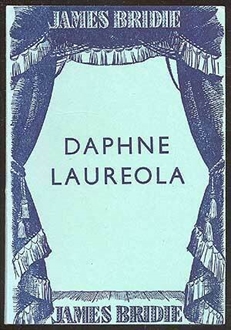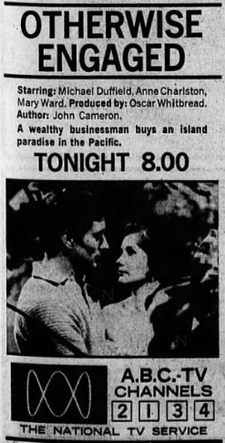Related Research Articles

James Bridie was the pseudonym of a Scottish playwright, screenwriter and physician whose real name was Osborne Henry Mavor. He took his pen-name from his paternal grandfather's first name and his grandmother's maiden name.

Daphne Laureola is a comic play by James Bridie about a young Polish refugee's infatuation with a middle-aged English woman. 'Egalitarianism is at the heart of this vision, but idealism may be just a liability.'
"The Big Killing" is a 1965 Australian television film which aired on ABC. A murder drama aired in a 70-minute time-slot, it was produced in ABC's Sydney studios. Producer was James Upshaw, whose previous works had included variety series The Lorrae Desmond Show.

"Otherwise Engaged" is a 1965 Australian television film which aired on ABC. Broadcast in a 60-minute time-slot, it was written by John Cameron and produced in Melbourne. "Otherwise Engaged" aired on 2 June 1965 in Sydney, and Melbourne, and on 23 June 1965 in Brisbane.
"A Time to Speak" is a 1965 Australian television film that aired on ABC. This period drama, set around 1900, was written by Noel Robinson. It was the third production to air within a three- week period. The film premiered on 7 April 1965, in Sydney and Melbourne.
"The Sweet Sad Story of Elmo and Me" is a 1965 Australian television film which aired on ABC as part of Wednesday Theatre. It aired on 28 July 1965 in Melbourne and Sydney.
"The Swagman" is a 1965 Australian television play. It aired as part of Wednesday Theatre on 31 March 1965 in Sydney and Melbourne.
"The Affair" is a 1965 Australian television play based on the novel by C. P. Snow. It starred Roger Climpson, Richard Meikle and Anne Haddy and aired on the ABC as part of Wednesday Theatre.
"The Winds of Green Monday" is a 1965 Australian television play by Michael Noonan. It aired as part of Wednesday Theatre on August 4, 1965 in Sydney and Melbourne, and on 1 September 1965 in Brisbane. It starred Terry Norris and was directed by Oscar Whitbread.
"The Tower" is a 1964 TV play broadcast by the Australian Broadcasting Corporation. It aired on 2 December 1964 as a stand-alone in Melbourne and on 28 April 1965 as part of Wednesday Theatre in Sydney. It aired on 6 January 1965 in Brisbane. It was based on a play by Hal Porter and directed by Christopher Muir in the ABC's studios in Melbourne.
"Ring Out Wild Bells" is a 1965 Australian television play which aired as part of Wednesday Theatre. It was based on a play by George Landen Dann and the third Brisbane produced ABC drama from ABQ after Vacancy in Vaughan Street and Dark Brown. "Ring Out Wild Bells" aired on 11 November 1964 in Brisbane, 10 February 1965 in Sydney and Canberra, and on July 1, 1965 in Melbourne.
"Dark Corridor" is a 1965 Australian TV play. It was an original play by Brisbane writer Trevor Nielsen.
Patrick Barton is an Australian TV director best known for his productions in the 1960s.
"Romanoff and Juliet" is a 1964 Australian television play based on the play by Peter Ustinov. It aired on 20 January 1965 in Sydney, and on 27 January 1965 in Melbourne.
"Waiting in the Wings" is a 1965 Australian television play. It was filmed in Melbourne. "Waiting in the Wings" aired on 21 July 1965 in Sydney, and Melbourne.
Love and War is a 1967 Australian TV series.
"How Do You Spell Matrimony?" is a 1965 Australian television play by Colin Free. It appeared on a double bill as part of Wednesday Theatre with The Face at the Club House Door.
"The Man Who Saw It" is a 1966 Australian TV play written by Allan Trevor and directed by John Croyston. It was an original for Australian television and aired as part of Wednesday Theatre on ABC on 2 November 1966 in Sydney.
"Moby Dick - Rehearsed" is a 1965 Australian TV play based on the 1955 play Moby Dick - Rehearsed by Orson Welles. It was shot in Sydney.
"Othello" is a 1964 Australian television play based on the play by William Shakespeare. It was broadcast on the ABC as part of Wednesday Theatre and filmed in ABC's Melbourne studios. It aired on 18 November 1964 in Melbourne, on 3 February 1965 in Sydney, and on 7 July 1965 in Brisbane.
References
- 1 2 "The Nymph and the Student". The Age. 29 April 1965. p. 13.
- ↑ "WEDNESDAY". The Canberra Times . Vol. 39, no. 11, 145. Australian Capital Territory, Australia. 3 May 1965. p. 16. Retrieved 20 March 2017– via National Library of Australia.
- ↑ "TODAY'S TV". The Canberra Times . Vol. 39, no. 11, 147. Australian Capital Territory, Australia. 5 May 1965. p. 27. Retrieved 19 February 2017– via National Library of Australia.
- ↑ Vagg, Stephen (18 February 2019). "60 Australian TV Plays of the 1950s & '60s". Filmink.
- ↑ "TV Guide". Sydney Morning Herald. 3 May 1965. p. 17.
- ↑ "TV Guide". The Age. 29 April 1965. p. 26.
- ↑ "Bridie Play on Channel 2". Sydney Morning Herald. 6 May 1965. p. 12.
- ↑ Riach, Alan (27 September 2021). "Perennially provocative". The National. p. 27. Retrieved 27 September 2021.